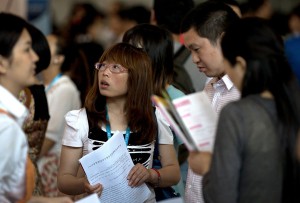 China currently is facing a huge education mismatch problem. Educated young people coming right out of college are unwilling to work the factory jobs that their parent’s held. What China needs is assembly-line workers who do not mind working all day long on backless stools. Factory manager Jin Tao is having a difficult time finding people to fill jobs in his factory. “I see the problem mostly as an education mismatch problem,” Mr. Jin said. “I’m willing to pay more than 3,000 renminbi a month, which is more than what fresh college graduates are getting.” (That’s about $500.) “I’m also willing to give training, but the young people now with college degrees just don’t want to work in factories.” For the past three decades the Chinese economy has thrived off of factory construction, bridges, roads and apartment towers, yet young educated Chinese are unwilling to work these jobs.
China currently is facing a huge education mismatch problem. Educated young people coming right out of college are unwilling to work the factory jobs that their parent’s held. What China needs is assembly-line workers who do not mind working all day long on backless stools. Factory manager Jin Tao is having a difficult time finding people to fill jobs in his factory. “I see the problem mostly as an education mismatch problem,” Mr. Jin said. “I’m willing to pay more than 3,000 renminbi a month, which is more than what fresh college graduates are getting.” (That’s about $500.) “I’m also willing to give training, but the young people now with college degrees just don’t want to work in factories.” For the past three decades the Chinese economy has thrived off of factory construction, bridges, roads and apartment towers, yet young educated Chinese are unwilling to work these jobs.
At the Third Plenum, Chinese officials will try to develop a solution to the great unemployment issue among young educated Chinese. The unemployment rate for recent graduates is around 25%. Many businesses are offering more money for their factory job openings and even low end employment – but cultural norms discourage college graduates from taking these positions. Almost three quarters of the high school population graduates, and the college graduation rate has quintupled since 2000.
Hopefully the employment/education mismatch situation changes in China. The government needs to develop a lasting solution to the problem in order to ensure that the great talent among Chinese students does not go to waste.
China’s education mismatch problem will get better with time. The Chinese government is making various policy decisions trying to increase the service sector of the economy, such as tax breaks for small business and more accessible financing for small business. The educated population that China has could support a potentially burgeoning service sector. Also, the aging population will also necessitate the creation of no small amount of healthcare jobs. More development will lead to more service sector jobs, for example with more cars come more mechanics and auto service jobs. Service sector growth in China, may have some obstacles and difficulties, but it is inevitable.
This education mismatch is an interesting issue that I would not have suspected to be present in China. The current rising wage for factory, assembly-line workers is a testament to this phenomenon. Driven by cultural norms coupled with a rapidly increasing educated population, both Chinese growth sectors and wage differentials will have to continue adjusting in order to counteract the elevated unemployment rate among young, college educated Chinese. I would expect, at least in the short-run, the oversupply of unemployed, educated youths to lower the median income of those employed. Also, as the differential between factory labor and the unemployed continues to expand, social norms will increasingly be broken. Second, as the median income for young, educated Chinese workers falls, sectors that are more human capital-intensive may begin to increase demand for the lower-paid educated youths. As a result, this may eventually increasingly stimulate human capital-intensive industries over the medium term, which would be beneficial for the long-run.
I agree with David that we might expect in the short-run that the median income of young, educated Chinese employees will begin to decrease. With that being said, I think that the surplus of unemployed educated college grads is a good problem for China to have. It will be difficult to entice these graduates to work in the factories because of the social norms that have arisen in China, and I believe that increasing wages will not solve this problem. The college grads will simply continue to turn it down because they believe they can make the same salary (or a higher one) working elsewhere and not in a factory on a stool. The factories need to start looking elsewhere for workers, or drastically improve the working conditions, hours, and pay if they think they have any chance of fixing this problem.
Might the factories close down and move to lesser developed countries like Vietnam or North Korea for their labor supply means. The reason why many manufacturing jobs left America and went to China was low labor wages in China compared with America. Might Chinese manufacturing jobs get outsourced in the near future? Status plays a role in modern society. Chinese graduates might ideally work for a bank or marketing firm but if there are not enough jobs available, either move back in with their parents or take the less glittery manufacturing jobs available.
Paul’s idea of moving the the factories to lesser developed countries to tap into the labor supply is a good suggestion. I don’t know what China expected to happen as its economy evolved. It is no secret that as an economy grows and develops so do its social classes and with that people and groups grow to have different desires and goals than the previous generation.